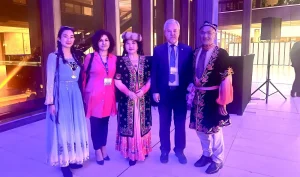Europe’s fragmented China policy weakens its influence. Unity, resolve, and real action are now essential for credible engagement with Beijing.
As the European Union and China mark the 50th anniversary of formal diplomatic relations, the mood in Brussels is far from celebratory. While China remains the EU’s largest source of imports, the relationship has become increasingly strained. In recent years, the European Commission has toughened its rhetoric on China — but as Alicja Bachulska, policy fellow at the European Council on Foreign Relations (ECFR), argues in her article “New tools: How the EU can show China it means business,” Beijing still struggles to take Europe seriously. That needs to change — and the EU now has new tools at its disposal to shift the balance.
Strategic Frustrations
Europe’s frustrations with China are well-known: unfair market access, overcapacity in key sectors such as electric vehicles and solar panels, economic coercion through export restrictions on critical raw materials, and Beijing’s growing alignment with Moscow despite Russia’s invasion of Ukraine. These grievances resonate across Europe’s political spectrum, though the tone varies between capitals. The broader consensus, however, is unmistakable: China is no longer just a strategic partner; it is increasingly seen as a systemic rival.
And yet, despite rising tensions, Europe has struggled to move beyond verbal warnings. As Bachulska notes, “the EU’s lack of strategic unity and leadership makes it vulnerable to China’s traditional ‘wait and see’ approach.”
Token Gestures, Strategic Stalemate
Recent developments may give the illusion of progress. Beijing has partially lifted sanctions on some Members of the European Parliament, and in May, Xi Jinping and Emmanuel Macron agreed to resolve a dispute over French cognac exports. However, such gestures appear more tactical than transformative. Beijing continues to push for ratification of the long-stalled Comprehensive Agreement on Investment (CAI)—a deal that the European Parliament froze in 2021 and shows no signs of reviving.
This disconnect reflects a deeper problem: both sides continue talking past each other. China views Europe as fragmented and weak, preferring to engage bilaterally with member states rather than with Brussels. As long as Europe lacks strategic unity, it remains easy for Beijing to divide, delay, and dominate. If Europe wants to be taken seriously, it must speak with one voice—and be prepared to act.
Divide and Rule: A Strategy That Still Works
One of the clearest signs of Europe’s vulnerability is China’s continued use of its longstanding divide and rule strategy. Beijing deliberately bypasses Brussels and engages directly with individual member states to exploit their differing interests and prevent the emergence of a cohesive EU stance. As Bachulska emphasizes, the Chinese leadership has little incentive to treat the EU as a unified actor when it can extract concessions bilaterally. A string of European leaders and foreign ministers visiting China in recent months—each pursuing national interests rather than a coordinated EU agenda—has only confirmed to Beijing that Europe remains fragmented and easily manipulated.
This diplomatic fragmentation allows China to stall or dilute European initiatives, often undermining the more assertive positions taken by the European Commission. For Beijing, a divided Europe is a manageable Europe.
New Tools Require Real Use
The EU has significantly expanded its policy arsenal in recent years. New instruments include export controls, investment screening mechanisms, anti-coercion tools, and trade defence measures such as anti-subsidy investigations. But these instruments are only as strong as Europe’s willingness to apply them.
If Beijing continues to ignore European concerns, Brussels must demonstrate that these tools are not just symbolic—but functional. As Bachulska argues, credibility is key: “issuing threats without follow-through will only reinforce the image of Europe as all bark and no bite.” A principled but proactive approach—where warnings are backed by action—is essential if the EU is to be perceived as a serious player.
Conclusion: Power Is Perceived Through Action
If the EU wants to alter Beijing’s calculus, it must demonstrate unity, clarity, and resolve. Dialogue remains essential, but without credible deterrents and coordinated responses, European concerns will continue to fall on deaf ears.
As the geopolitical rivalry between Washington and Beijing intensifies, Europe’s ability to carve out an independent and respected China policy will depend not on statements, but on unified, strategic, and sustained action. Only then will Brussels be heard in Beijing—not as an echo of Washington, but as a power in its own right.
Please credit the source if you copy or republish this article.






Be First to Comment